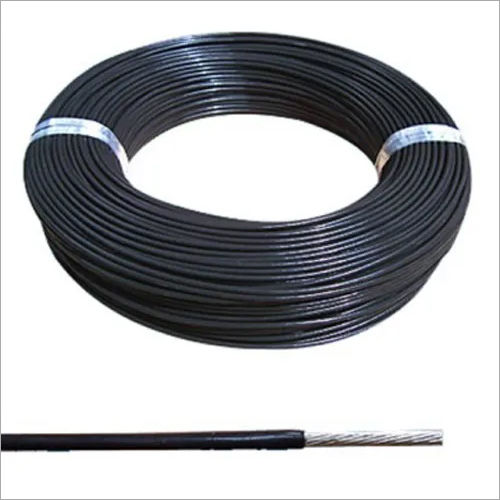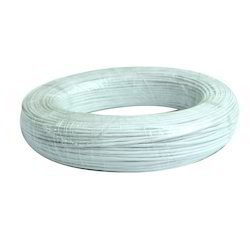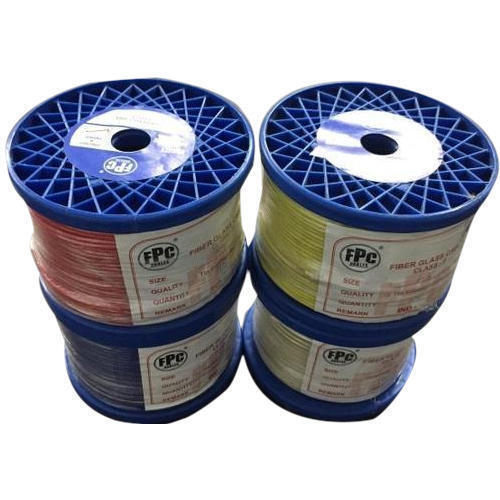

PTFE Cables
9 INR/Meter
Product Details:
- Product Type Cable
- Material PTFE
- Color Black, White
- Click to view more
X
PTFE Cables Price and Quantity
- 9 INR/Meter
- 500 Meter
PTFE Cables Specification
- Cable
- PTFE
- Black, White
PTFE Cables Trade Information
- Mumbai / Bhiwandi
- Cash Against Delivery (CAD) Cash in Advance (CID)
- 1000000 Meter Per Month
- 1 Days
- Yes
- Free samples are available
- All India
- UL / RoHS / CE
Product Description
PTFE Cable is ideal for the applications includes high frequency and high temperature generation. It is manufactured from the assured grade PTFE (Poly Tetra Fluoro Ethyline) under precision pf advance technologies in order to ensure its flawless construction as per defined standards. It is flexible and has outstanding mechanical stability. It is non flammable and extremely durable. Customers can avail this cable from us in a wide range of specifications as per requirements at leading market rates.
Specifications of PTFE Cables:
1. Product implementation standards: UL758; UL certification number: E252215
2. Style No.: AWM1213
3. Size: 32AWG10AWG
4. Rated Voltage: 1100
5. Rated Temperature: - 60 degree centigrade + 105 degree centigrade
6. Conductor: silver or Nickel copper
7. Material: PTFE
8. Color: red / yellow / blue / white / black / yellow green / brown / orange / purple / green / etc
Applications of Poly Tetra Fluoro Ethyline Cable:
1. Aerospace: PTFE cables are used extensively in the aerospace industry due to their resistance to high temperatures, chemicals, and radiation. They are used for wiring in aircraft and spacecraft, where performance under extreme conditions is essential.
2. Medical Devices: Poly Tetra Fluoro Ethyline cables are used in medical devices such as endoscopes, surgical instruments, and diagnostic equipment. Their biocompatibility and resistance to sterilization methods make them ideal for medical applications.
3. Telecommunications: PTFE cables are used in high-frequency and microwave applications, such as radar systems and communication equipment. They have low signal loss and can handle high-frequency signals without significant attenuation.
4. Industrial Automation: PTFE cables are used in industrial automation systems and control panels, where resistance to oils, chemicals, and high temperatures is necessary.
5. Chemical Processing: Poly Tetra Fluoro Ethyline cables are used in chemical plants and laboratories where they can withstand exposure to corrosive chemicals and extreme temperatures.
6. Military and Defense: PTFE cables find applications in military equipment and defense systems due to their durability, resistance to harsh environments, and ability to transmit data and power reliably.
7. Oil and Gas: PTFE cables are used in the oil and gas industry for downhole applications, where they need to withstand high-pressure, high-temperature, and corrosive environments.
8. Automotive: In automotive applications, Poly Tetra Fluoro Ethyline cables are used in engine compartments and for wiring that must endure high temperatures and exposure to chemicals and fuels.
9. Power Generation: PTFE cables are used in power generation plants, including nuclear power plants, where they are exposed to radiation, high temperatures, and harsh chemicals.
10. Laboratory and Research: PTFE cables are used in laboratory equipment and scientific research applications, where precision and resistance to chemicals are essential.
11. Food and Beverage Industry: PTFE cables are used in food processing and packaging equipment, where they must be resistant to food-grade chemicals and high temperatures.
12. Semiconductor Manufacturing: PTFE cables are used in semiconductor manufacturing equipment, where they need to maintain signal integrity and resist chemical exposure.
13. Railway and Transportation: Poly Tetra Fluoro Ethyline cables find applications in railway systems and transportation infrastructure due to their ability to withstand extreme weather conditions and mechanical stress.
14. Marine and Shipbuilding: PTFE cables are used in marine applications because of their resistance to saltwater, UV radiation, and harsh weather conditions.
15. Renewable Energy: Poly Tetra Fluoro Ethyline cables are used in solar panels and wind turbines, where they must endure outdoor exposure and extreme weather conditions.
PTFE Cable FAQ:
1. What is PTFE?
Ans: PTFE stands for Polytetrafluoroethylene, which is a synthetic polymer made from tetrafluoroethylene. It is known for its non-stick and high-temperature resistance properties.
2. What are PTFE cables?
Ans: PTFE cables are electrical cables with insulation and sheathing made from PTFE material. They are used in various applications where resistance to high temperatures, chemicals, and electrical properties are essential.
3. What are the advantages of using PTFE cables?
Ans: Advantages of Poly Tetra Fluoro Ethyline cables include excellent electrical insulation properties, high-temperature resistance, chemical resistance, low friction, flexibility, and resistance to UV radiation.
4. Where are PTFE cables commonly used?
Ans: PTFE cables find applications in aerospace, telecommunications, medical devices, industrial automation, chemical processing, military and defense, oil and gas, automotive, and many other industries.
5. Are PTFE cables suitable for high-frequency applications?
Ans: Yes, PTFE cables are often used in high-frequency and microwave applications due to their low signal loss and excellent dielectric properties.
6. What temperature range can PTFE cables withstand?
Ans: Poly Tetra Fluoro Ethyline cables can typically withstand temperatures ranging from -100 degree centigrade or even higher, depending on the specific type of PTFE material used.
7. Are PTFE cables resistant to chemicals?
Ans: Yes, PTFE cables are highly resistant to a wide range of chemicals, including acids, bases, solvents, and corrosive substances.
8. Can PTFE cables be used in outdoor applications?
Ans: Poly Tetra Fluoro Ethyline cables are suitable for outdoor applications, but exposure to UV radiation over extended periods may cause some degradation. UV-resistant outer sheaths can be added for enhanced outdoor durability.
9. Can PTFE cables be customized for specific requirements?
Ans: Yes, PTFE cables can be customized in terms of conductor size, insulation thickness, shielding, and other factors to meet specific electrical and environmental requirements.
10. Are PTFE cables more expensive than other types of cables?
Ans: PTFE cables are generally more expensive than some other cable types due to the high-performance materials used in their construction. However, their durability and long lifespan often justify the higher cost.
11. How do I terminate or connect PTFE cables?
Ans: Poly Tetra Fluoro Ethyline cables can be terminated using standard connectors compatible with the cable type. Specialized connectors designed for high-temperature and high-frequency applications may be required in some cases.
12. Are there different types of PTFE materials for cables?
Ans: Yes, there are different types of PTFE materials used for cables, including standard PTFE, PTFE with additives for enhanced properties (e.g., PTFE with glass fillers), and expanded PTFE (ePTFE) for specific applications.
Tell us about your requirement

Price:
Quantity
Select Unit
- 50
- 100
- 200
- 250
- 500
- 1000+
Additional detail
Mobile number
Email

 English
English Spanish
Spanish French
French German
German Italian
Italian Chinese (Simplified)
Chinese (Simplified) Japanese
Japanese Korean
Korean Arabic
Arabic Portuguese
Portuguese





